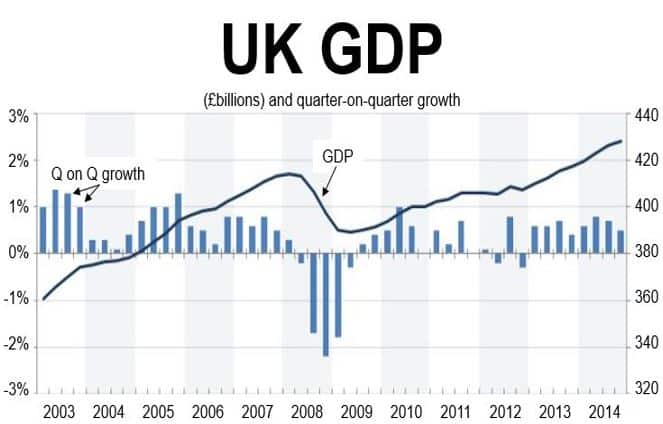UK Gross Domestic Product (GDP) grew by 2.6% in 2014, the greatest rate of expansion since 2007, and considerably higher than the 1.7% posted in 2013, the Office for National Statistics informed on Tuesday.
In the fourth quarter of 2014, GDP grew by 0.5% versus the previous quarter, which was slower than the third quarter’s 0.7%. Compared to Q4 2013, GDP expanded by 2.7% in Q4 2014.
Most experts agree that it is not possible to determine whether the slowdown is temporary just from the results of one quarter. A higher percentage of UK economists believe growth is slowing and will remain more moderate, versus those who believe the Q4 figures were just a blip.

Source: Office for National Statistics.
With the general election 100 days away, investors are likely to become progressively more jittery.
The BBC quoted Joe Grice, chief economist at the Office for National Statistics (ONS), who said:
“It is too early to say (whether the slowdown will persist). The dominant services sector remains buoyant while the contraction has taken place in industries like construction, mining and energy supply, which can be erratic.”
While the services and agriculture sectors expanded by 0.8% and 1.3% respectively in the fourth quarter, construction shrank by -1.8%. Manufacturing only managed 0.1% growth, its worst performance in nearly two years.
Chancellor George Osborne tweeted today “GDP up 0.5%: recovery is on track & plan is protecting Britain from the economic storm. 2.6% growth in 2014 fastest of any major economy.”
Labour’s Shadow chancellor Ed Balls said the fourth-quarter slowdown was a concern. He also mentioned working people’s loss of purchasing power since 2010.
At the end of Q4 2014, GDP was estimated to have been 3.4% bigger than it was in Q1 2008, the quarter just before the financial crisis. From the peak in Q1 2008 to the trough in Q2 2009, the economy contracted by -6%.
A Construction Skills Network report published today predicted that 224,000 new construction jobs will be created in the UK over the next five years, thanks to strong investment in the infrastructure, housing and leisure sectors.
